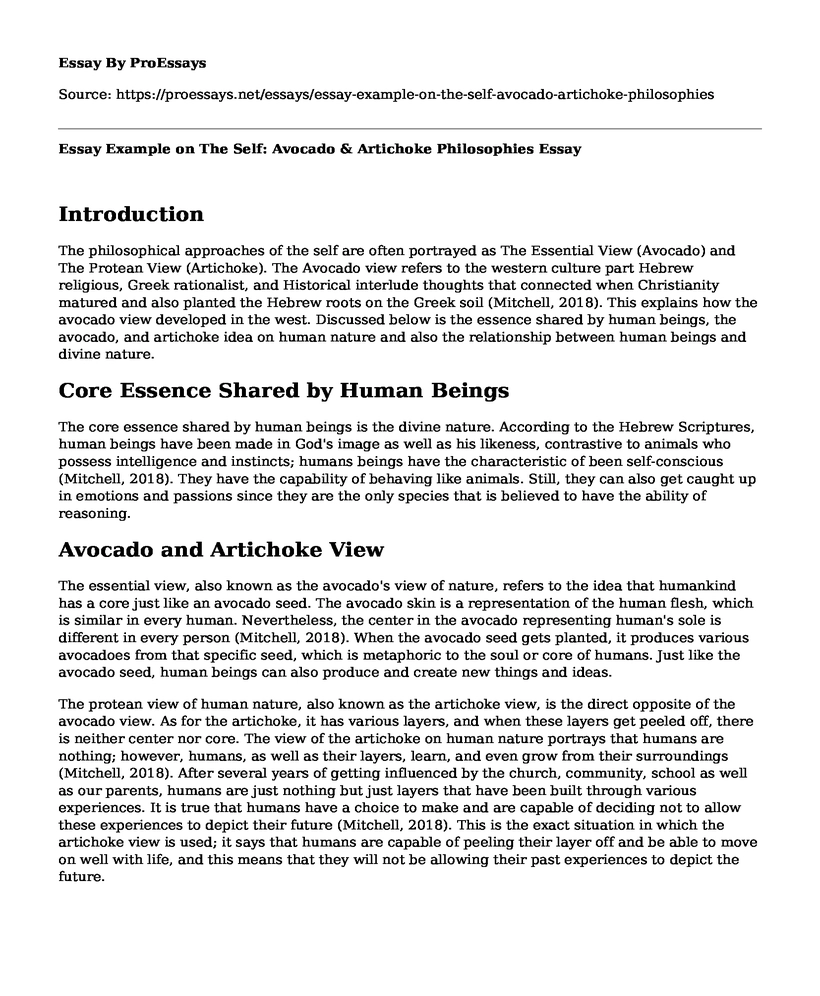Introduction
The philosophical approaches of the self are often portrayed as The Essential View (Avocado) and The Protean View (Artichoke). The Avocado view refers to the western culture part Hebrew religious, Greek rationalist, and Historical interlude thoughts that connected when Christianity matured and also planted the Hebrew roots on the Greek soil (Mitchell, 2018). This explains how the avocado view developed in the west. Discussed below is the essence shared by human beings, the avocado, and artichoke idea on human nature and also the relationship between human beings and divine nature.
Core Essence Shared by Human Beings
The core essence shared by human beings is the divine nature. According to the Hebrew Scriptures, human beings have been made in God's image as well as his likeness, contrastive to animals who possess intelligence and instincts; humans beings have the characteristic of been self-conscious (Mitchell, 2018). They have the capability of behaving like animals. Still, they can also get caught up in emotions and passions since they are the only species that is believed to have the ability of reasoning.
Avocado and Artichoke View
The essential view, also known as the avocado's view of nature, refers to the idea that humankind has a core just like an avocado seed. The avocado skin is a representation of the human flesh, which is similar in every human. Nevertheless, the center in the avocado representing human's sole is different in every person (Mitchell, 2018). When the avocado seed gets planted, it produces various avocadoes from that specific seed, which is metaphoric to the soul or core of humans. Just like the avocado seed, human beings can also produce and create new things and ideas.
The protean view of human nature, also known as the artichoke view, is the direct opposite of the avocado view. As for the artichoke, it has various layers, and when these layers get peeled off, there is neither center nor core. The view of the artichoke on human nature portrays that humans are nothing; however, humans, as well as their layers, learn, and even grow from their surroundings (Mitchell, 2018). After several years of getting influenced by the church, community, school as well as our parents, humans are just nothing but just layers that have been built through various experiences. It is true that humans have a choice to make and are capable of deciding not to allow these experiences to depict their future (Mitchell, 2018). This is the exact situation in which the artichoke view is used; it says that humans are capable of peeling their layer off and be able to move on well with life, and this means that they will not be allowing their past experiences to depict the future.
Relationship between Human and Divine Nature
There is a relationship between human and divine nature since humans are believed to share the divine nature. Humans have some similar traits with the animals like been able to learn, survive as well as intelligence. Humans are able to hunt for their foods, and so do the animals. Humans have the capability of showing compassion and emotions, and animals can also do the same (Mitchell, 2018). Both Aristotle and Plato agree that in order to be fully human, one must express who they are most truly (Mitchell, 2018). This relates to the human being's core; the human's soul or the core is what makes them unique beings.
Conclusion
In conclusion, all humans share the divine nature and have a soul or a core, and this is what makes them similar to the avocado, which has a seed at its center. Humans can also produce various things and ideas, just like the way an avocado seed can do when planted. Humans are capable of ignoring their past and moving on with life just the way an artichoke peels its skin and grows a different one. Humans and animals have similar traits, like intelligence and the ability to learn.
Reference
Mitchell, H. B. (2018). Roots of Wisdom: A Tapestry of Philosophical Traditions. Cengage Learning.
Cite this page
Essay Example on The Self: Avocado & Artichoke Philosophies. (2023, Apr 09). Retrieved from https://proessays.net/essays/essay-example-on-the-self-avocado-artichoke-philosophies
If you are the original author of this essay and no longer wish to have it published on the ProEssays website, please click below to request its removal:
- Ethics in Immigration Bans and Deportation Essay
- Essay Example on Behavioural Modernity: Religion, Music and Dance in Humans
- Mackie's Argument on Queerness & Internalism - Essay Sample
- Essay Example on Moral Philosophy: An Evolving Study of Right and Wrong
- The Simpsons: Political Satire Reflecting the American Dream - Essay Sample
- Paper Sample on Ready for University: My Journey of Determination and Challenges
- The Vitality of Personal Data Privacy: Trust & Security - Free Paper Example







